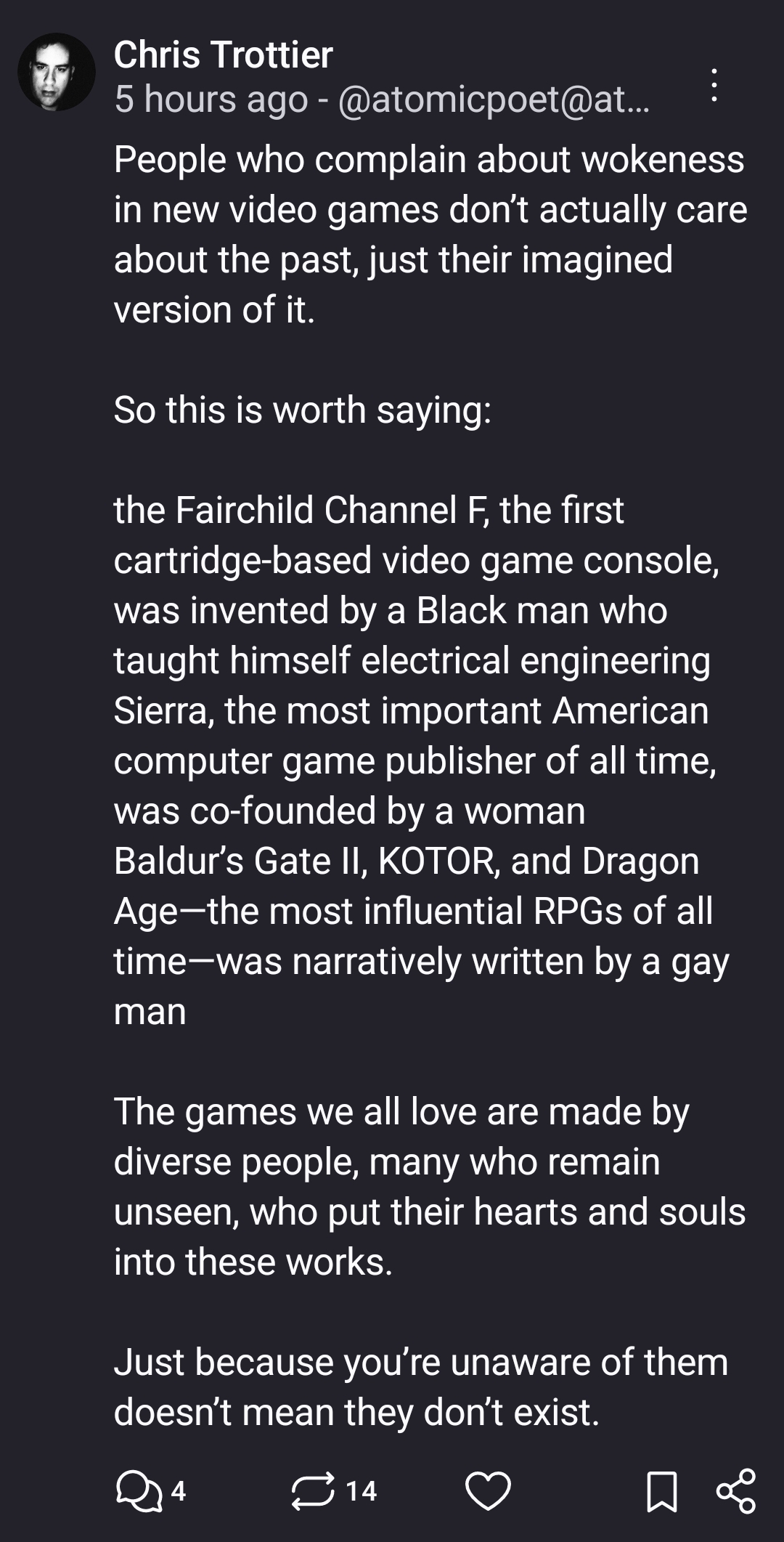this post was submitted on 28 Nov 2024
1188 points (94.5% liked)
Microblog Memes
5913 readers
2569 users here now
A place to share screenshots of Microblog posts, whether from Mastodon, tumblr, ~~Twitter~~ X, KBin, Threads or elsewhere.
Created as an evolution of White People Twitter and other tweet-capture subreddits.
Rules:
- Please put at least one word relevant to the post in the post title.
- Be nice.
- No advertising, brand promotion or guerilla marketing.
- Posters are encouraged to link to the toot or tweet etc in the description of posts.
Related communities:
founded 1 year ago
MODERATORS
you are viewing a single comment's thread
view the rest of the comments
view the rest of the comments

While I agree with your first point - corporate pseudo-progressivism is a stain - I don't really think it's fair to call it "woke". In fact, it's almost the opposite of what woke is supposed to mean. To be "woke" originally meant having "woken up" to the reality of systemic racism... Corpos thoughtlessly stuffing games/films with "diverse" casts are not really respecting that reality. It's performative. There is an argument that it improved things for actors regardless, but I still don't think it's "woke".
On your second point I have to slightly disagree. Taking Bridgerton as an example - set in something like Victorian England, but a racially diverse one. The Queen is black, there's a black Duke. I think these things immediately set the story apart from real Victorian England. Ok, perhaps if you know nothing about history it might be confusing, but to me I see those things and immediately one of two things is true:
Given that it's fiction, I don't mind either of these things. I think it's nice for people who aren't white to be able to imagine themselves in those stories, even if in the real history things would have been much different. Bridgerton isn't trying to present a vision of real historical events, it's primarily a romance. Just like mediaeval fantasy isn't really medieval, Victorian romance doesn't need to really be Victorian. We don't need to see the systemic racism any more than we need to see the cholera or dropsy or whatever.
I will also just briefly shill for Taboo which I just finished - that's a historical show which incorporates a "realistic" amount of diversity into it's cast while maintaining (at least what appears to me) a level of historical accuracy. The story is fictional, although it appears around real events... But the world it presents feels genuine. Crucially by contrast to Bridgerton, slavery plays quite an important role in the story - so here it would feel absurd to have a black Queen or Duke.
Haven’t seen Taboo but Bridgerton is a fantasy alt world - it can have steam-powered computers for all I care. My objection is specifically about falsely portraying real eras for the sake of casting diversity, which I think is a disservice to people who were held down in those real eras.
Fair enough, I have seen the same arguments applied to it is why I used it as an example. I don't know what shows you are thinking of, but are they misrepresenting things, or are they just using blind casting and asking you to suspend your disbelief? This is something we do without thinking when watching theatre, but it's a bit more subtle when watching television or films because they go to lengths to make the environment feel more real.
Suspension of disbelief is great for science fiction and fantasy, but I don't think it's healthy to mask past realities. I don't believe for one second anybody does "blind" casting - entertainment companies pander to what they think their audience's main demographic wants, and they do extensive research to tell them what that is. They want to be on the audience's side on every issue, support all the right things, criticize all the right things... there's nothing blind or random about any of it.
Perhaps, or perhaps the casting team had other goals that aren't so obvious. While it's true there are purely capitalistic production firms, there are clearly things being made with artistic vision behind them, and sometimes that includes blind casting. Again, I suspect this is more prevalent in theatre, where audiences are more willing to accept, say, a woman playing King Lear, or black actors playing nobles in a historical setting. Because, on stage, you are already suspending lots of that disbelief - you're not looking into a throne room, you're looking at a stage - it's easier to take it a step further.
But while less is asked of you when watching a historical drama on TV, you are nonetheless suspending your disbelief. You know really that cameras couldn't have filmed this in the Victorian era, that's not really Henry VIII, and Jesus wasn't a white guy. The question is what makes it too jarring for you?
I noticed you're quite focused on the production company's intent behind the casting. Maybe it's politically/philosophically motivated, maybe purely capitalist, or maybe artistic... But you can't really know. And should it even matter to you as the viewer? I understand trying to unpick the artistic decisions behind a piece, but those of the production company? That doesn't seem like something to bring into your viewing experience - just perhaps conversations like this one on the internet.
I'd invite you to try suspending your disbelief as you might when watching the Passion of the Christ, and see if you're able to enjoy these films/shows despite the historical inaccuracies.